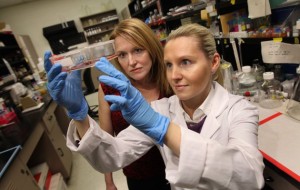
Lisa Porter, left, and Dorota Lubanska look at human brain cancer cells at the University of Windsor on Thursday, January 16, 2013.
University of Windsor researchers have identified a protein that causes brain tumours to return — a finding that could ultimately help save lives.
Published this week in the respected U.S. medical journal Cancer Cell, five years of research shows that hiding among many less dangerous cousins is one nasty protein — aptly named Spy1, and nicknamed Speedy — that appears in high numbers in recurring brain-tumour cells.
“One of the big things about brain tumours is that you can treat them but very often they reoccur, and if they reoccur they become more aggressive,” Lisa Porter, a University of Windsor associate professor of biological science who led the research team, said Thursday. “Finding out why certain populations of cells in a brain tumour come back is a major goal for a lot of people.”
The research team included Porter and fellow University of Windsor scientists Dorota Lubanska, Brenna Market-Velker, and Elizabeth Fidalgo da Silva. As well, the paper’s authors include Ana deCarvalho and Tom Mikkelsen from Henry Ford Hospital in Detroit. The research was funded by the Canadian Cancer Society and the Cancer Research Society.
Now that researchers from the University of Windsor and Henry Ford Hospital have proved that Spy1 is so determined to keep brain tumours alive, doctors can concentrate on killing it.
“You want to get rid of all of the tumour cells, but they’re not all equally deadly,” Porter said. “So we could target the population of cells that are the most dangerous, the ones we really want to get rid of.”
Porter believes the breakthrough with the Spy1 cell-growth protein happened thanks to cross-border co-operation. Her team was on the right track but needed recent patient samples — something available just across the Detroit River, but buried under red tape.
So in 2012 she helped found the Windsor Cancer Research Group, now comprised of 25 researchers and clinicians from the university and Windsor Regional Hospital. In October, the group launched a $100,000 fund-raising campaign to create a freer flow of tissue, animals and information across the border through an initiative called Passports: Bridging Research and Hope. Caesars Windsor donated the first $25,000.
On Thursday, Windsor Regional Hospital also donated $25,000, with a promise of another $25,000 if the group can raise the same amount on its own. Billed as “the first global cancer research office,” the project now has $50,000 and counting.
“It took us a long time to work through all the red tape, to get these kinds of tissues to enable this kind of work,” Porter said. “We want these collaboration to happen much quicker.”
For three years, Porter’s group worked with lab-grown cells. But lab cells mutate slightly over time. Using samples from patients provides more reliable data, something Porter wishes she had years ago.
“For sure it would have shaved years off, because we started using alternatives to human samples since we didn’t have access to real ones,” she said. “We would have got our answers much quicker had we been able to jump right in and use actual patient samples.
“Making this an easier process will help researchers in Windsor and Detroit.”
Source: The Windsor Star, Craig Pearson